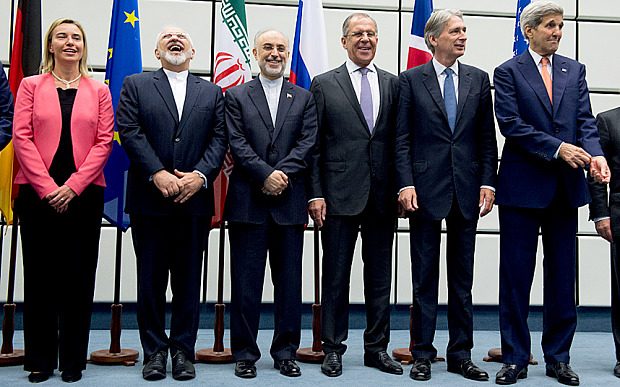IN THE MEDIA
Iranian deal’s a setback for international nuclear non-proliferation
July 22, 2015 | Sharyn Mittelman

Sharyn Mittelman
Canberra Times – July 22, 2015
http://www.canberratimes.com.au/comment/iranian-deals-a-setback-for-international-nuclear-nonproliferation-20150722-gii9pd.html#ixzz3gmTJ8Tet
Discussing the Iranian nuclear deal on CNN with Wolf Blitzer on July 15, US National Security Adviser Susan Rice said, “We should expect that some portion of that money would go to the Iranian military and could potentially be used for the kinds of bad behaviour that we have seen in the region up until now.”
Ms Rice added, “But the goal here, Wolf, was never, and was not designed to prevent them from engaging in bad behaviour in region. They’re doing that today. The goal is to ensure that they don’t have a nuclear weapon, and therefore, when they are engaging in that bad behaviour, are that much more dangerous.”
However, many analysts believe that is a key problem with the deal – it intentionally ignored Iran’s “bad behaviour” – its record of supporting global terrorism and its human rights abuses.
Iran came to the negotiating table after crippling international sanctions were hurting its economy. The US and the other five world powers should have had the upper hand to demand that Iran not only back away from developing nuclear weapons but that it change its behaviour – stop its support for terrorism and improve its human rights record. But instead these issues were excluded from the deal, and the US lost its upper hand as it became clear that President Obama was desperate for a deal before his presidency expired.As Congress will likely be unable to overturn the agreement, attention will now turn to the US presidential candidates and their views on the deal. Republican frontrunners have condemned the deal, with Marco Rubio stating on Twitter, “I will give Iran a choice: change your behaviour, or face the collapse of your economy due to US pressure.” Democrat frontrunner Hillary Clinton has cautiously welcomed the deal.
Some analysts who support the deal have claimed that it will bring in Iran from the cold, and help support moderates in Iran. However, such analysis appears to be wishful thinking. The deal will likely empower a tyrannical Ayatollah regime seeking to export an “Islamist revolution”. Despite western praise for President Rouhani, human rights abuses in Iran have actually become worse since his 2013 election, according to the UN.
Ahmed Shaheed, the UN special rapporteur on Iran reported in March that Iran has witnessed a soaring number of executions and the jailing of journalists and activists. Mr Shaheed told the Guardian that “Iran continues to execute more individuals per capita than any country in the world,” and that a majority of all executions in the country are for drug-related offences or other crimes, including adultery, sodomy, and “vaguely worded national security offences” that do not meet international standards for when the death penalty is permissible. Mr Shaheed also discussed the concern that the nuclear negotiations were “casting a shadow over the human rights discussions.”
Moreover, as Ms Rice admits, we can expect that once Iran receives its around $100 billion in sanctions relief it will further its ambitions of regional hegemony by supporting its allies – the Assad regime in Syria, Houthi rebels in Yemen, and terrorist groups Hezbollah, Hamas and Islamic Jihad. For those who believe that Iran can be an ally to the West in the war against IS it is worth recalling Iran’s support for terrorism and its efforts to destabilise the Middle East.
The US State Department lists Iran as a state sponsor of terrorism, and regarding its role in Syria reports: “In 2014, Iran continued to provide arms, financing, training, and the facilitation of primarily Iraqi Shia and Afghan fighters to support the Asad regime’s brutal crackdown that has resulted in the deaths of at least 191,000 people in Syria, according to August UN estimates.”
Another key criticism of the Iran deal is its weak inspection regime. Iran does not need nuclear power – it is an oil and gas rich country. Iran has a history of building secret nuclear facilities and hiding information from international inspectors. Therefore, for any deal to be effective it would require “anytime, anywhere” inspections. But that is not in the deal. Instead the deal has created a dispute resolution mechanism that could enable Iran with enough time to hide any suspected breaches. And if there is a breach of the agreement the promise of “snap back” sanctions appears unlikely.
Given that Iran’s neighbours including Israel and many in the Sunni Arab world will not be convinced that Iran will be stopped from obtaining nuclear weapons, this deal could lead to a nuclear arms race in a region that is already in the midst of violent sectarian conflict. Some analysts are comparing the Iran deal with the failed attempt to stop North Korea from obtaining nuclear weapons. A much more successful diplomatic agreement was the deal with Libya in 2003 when Muammar Gaddafi agreed to completely eliminate its weapons of mass destruction.
The six global powers were right to seek a diplomatic agreement to Iran’s nuclear program, but they should have demanded a diplomatic agreement that works. Ultimately the perception of the deal is that it has legitimised Iran as a nuclear threshold state, and this is enough to significantly set back the course of international nuclear non-proliferation.
Sharyn Mittelman is a senior policy analyst at the Australia/Israel and Jewish Affairs Council.
Tags: Iran





